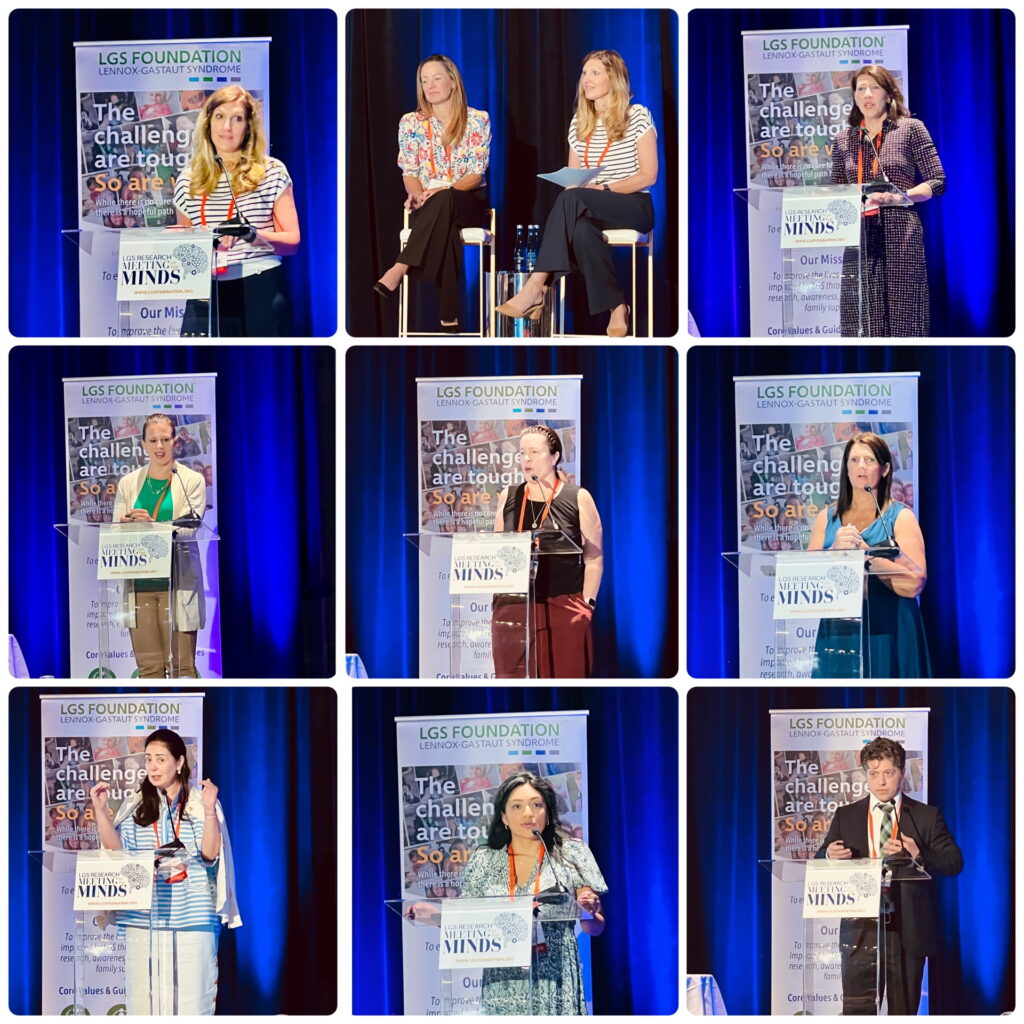When great minds meet, great breakthroughs happen!
 The 2025 LGS Research Meeting of the Minds, held July 21–22, brought together over 100 caregivers, healthcare professionals, researchers, and industry partners committed to improving care for individuals living with Lennox-Gastaut Syndrome (LGS) and associated developmental and epileptic encephalopathies (DEEs). The meeting served not only as a forum for education and collaboration, but also as a launchpad for new research initiatives that align closely with patient needs.
The 2025 LGS Research Meeting of the Minds, held July 21–22, brought together over 100 caregivers, healthcare professionals, researchers, and industry partners committed to improving care for individuals living with Lennox-Gastaut Syndrome (LGS) and associated developmental and epileptic encephalopathies (DEEs). The meeting served not only as a forum for education and collaboration, but also as a launchpad for new research initiatives that align closely with patient needs.
This year’s theme, Advancing Evidence-Based LGS Care Across the Lifespan, reflected a clear mission: to identify knowledge gaps, prioritize research directions, and build consensus on improving care strategies for LGS—from early childhood through adulthood.
Key Themes and Outcomes
Through collaborative breakout sessions and expert-led discussions, attendees reached consensus on three major research priorities:
- Biomarkers – Developing reliable indicators to subtype LGS and guide personalized treatment.
- Natural History Registry – Collecting long-term data to understand how LGS evolves over time.
- Best Treatments for LGS – Determining which therapies work best, for whom, and when.
These focus areas will shape the LGS Foundation’s funding and research strategies over the next few years.
Bridging the Gaps in LGS Care
Several critical gaps were highlighted:
- Delayed or missed diagnoses, especially in adult patients.
- Lack of multidisciplinary care and coordinated transition from pediatric to adult providers.
- Absence of standardized treatment guidelines, such as which medications to use and when.
- Insufficient adult providers trained to manage LGS.
- Poor understanding of comorbidities and the long-term course of the disease.
- Barriers due to socioeconomic status and systemic issues.
Attendees emphasized the urgent need for evidence-based clinical tools and patient education resources that can be used across all stages of life.
Collaborative Solutions in Action
Several exciting projects and partnerships were announced or advanced during the meeting:
- Consensus Guidelines: Work is underway to create both North American and global LGS treatment guidelines.
- Patient Registry Launch: The Foundation plans to launch Phase 2 of the Learn from Every Patient Database by year-end, aiming to enroll 1,000 participants within three years.
- Translational Research Models: New collaborations on fish and mouse models are exploring the biology of LGS to inform future therapies.
- Transition of Care: Plans are being developed for a model that supports youth moving into adult care, leveraging insights from successful programs such as those in CHD.
- Sleep & EEG Studies: Ongoing studies aim to better understand LGS-related sleep disturbances and brainwave patterns.
“I especially enjoy the breakout groups and the rich networking between caregivers, researchers, clinicians, and pharma partners; it’s a unique space for collaboration and shared learning.” – Meeting Attendee
A Shift Toward Personalized, Patient-Centered Research
A key takeaway from this Meeting of the Minds was the emphasis on measuring what matters most to families—not just seizures, but also cognitive, behavioral, sleep, and quality-of-life outcomes. Conversations highlighted the unique role that nonprofits – like the LGS Foundation – play in aligning research with patient priorities.
“Because we commit our minds to science and our hearts to compassion, even the most complex challenges—like LGS—have become opportunities for hope and change.” -Tracy Dixon-Salazar, PhD, Executive Director of the LGS Foundation and Mom to Savannah
Looking Ahead
As one attendee put it, “We didn’t just talk—we planned, prioritized, and committed.” From energizing the adult LGS provider community to outlining new paths for early diagnosis and individualized care, this research conference showcased the momentum and collaboration needed to create real change.
The LGS Foundation is already working to convene expert teams, launch the next phase of the Learn From Every Patient Database, and fund groundbreaking studies that will move the field forward. With these efforts, we edge closer to a world where every person with LGS receives the right care, at the right time—every time.
“There is a lot of work ahead, but the progress already made and the efforts still underway are incredibly inspiring for our LGS community.” – Kurt, Meeting Attendee and Dad to Addison
Watch the NeurologyLive® Roundtable
Watch the Recordings on YouTube
Updated 09/09/25 (AM)
